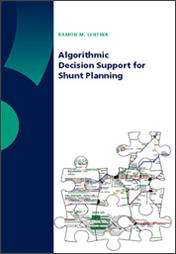Algorithmic Decision Support for Shunt Planning
By Ramon Lentink
Abstract
 One of the last elements of the planning process of a passenger railway operator is operational shunt planning. It focuses on the logistics within a station and its surroundings. Since demand for transportation fluctuates over a day, a railway operator typically has a surplus of rolling stock outside the rush hours, and especially during the night. In general, the idle rolling stock is parked at a shunt yard, thereby keeping the main railway infrastructure available for other train services. Besides parking of rolling stock, matching of arriving to departing rolling stock, routing over local railway infrastructure, cleaning of rolling stock, and crew planning are part of shunt planning. "Algorithmic Decision Support for Shunt Planning" introduces relevant aspects of shunting and provides a first step for quantitative models and algorithms to support shunt planning. The algorithms for solving the models contain algorithms that resemble the current practice of shunt planners as well as algorithms that are somewhat farther away from current practice. Computational tests on real-life data show that high-quality solutions are typically found within minutes of computation time. In addition, these algorithms are designed to interact with shunt planners. They provide a firm basis for an advanced planning system to support shunt planners.
One of the last elements of the planning process of a passenger railway operator is operational shunt planning. It focuses on the logistics within a station and its surroundings. Since demand for transportation fluctuates over a day, a railway operator typically has a surplus of rolling stock outside the rush hours, and especially during the night. In general, the idle rolling stock is parked at a shunt yard, thereby keeping the main railway infrastructure available for other train services. Besides parking of rolling stock, matching of arriving to departing rolling stock, routing over local railway infrastructure, cleaning of rolling stock, and crew planning are part of shunt planning. "Algorithmic Decision Support for Shunt Planning" introduces relevant aspects of shunting and provides a first step for quantitative models and algorithms to support shunt planning. The algorithms for solving the models contain algorithms that resemble the current practice of shunt planners as well as algorithms that are somewhat farther away from current practice. Computational tests on real-life data show that high-quality solutions are typically found within minutes of computation time. In addition, these algorithms are designed to interact with shunt planners. They provide a firm basis for an advanced planning system to support shunt planners.
About Ramon Lentink
Ramon Lentink was born in Apeldoorn, the Netherlands on October 27, 1975. After completing his secondary school education at De Heemgaard in Apeldoorn, he started his study Econometrics at the Free University of Amsterdam in 1995. In 1999, he graduated with a Master’s thesis on train crew scheduling. The thesis was written at ORTEC, one of the key providers of advanced planning systems, and the developed algorithms were applied to real-life problems provided by NS Reizigers, the largest Dutch passenger railway operator. From September 1999, he has been working as a consultant at ORTEC. Here, he applies Operations Research models and algorithms to problems of clients in the aviation and railway industry. His focus is on crew planning problems. These activities led to a paper in Annals of Operations Research and several papers in proceedings of conferences. In October 2000, he started a part-time Ph.D. study at the Rotterdam School of Management of the Erasmus University Rotterdam, while he remained part-time employed at ORTEC. The subject of his Ph.D. research is the development of mathematical models and algorithms for supporting railway shunt planners. This thesis is the result of the Ph.D. study. The corresponding research was carried out in close cooperation with the logistics department of NS Reizigers. Besides his articles related to his work at ORTEC, his Ph.D. research resulted in a number of publications. These publications have been published or are forthcoming in scientific journals and a book with as subject a multidisciplinary view on planning. Moreover, he has presented his research work at various international conferences and workshops. In October 2002, Dennis Huisman and Ramon won the first prize in the first edition of the Management Science in Railroad Applications Student Competition, organized by the Rail Applications Special Interest Group of INFORMS and the journal Railway Age. The corresponding paper has been published in Transportation Science.
More information
Download this doctoral thesis (pdf)

